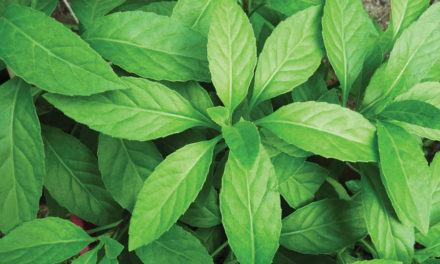
Botany saves the day for the health and beauty world once again with Japan’s ‘tomorrow leaf’, the Ashitaba plant. This Asian herb, scientifically known as the Angelica Keiskei Koidzumi, gets its name because of its magical health and beauty effects. More commonly it is referred to as the ‘tomorrow leaf’ because of its quick regeneration process of leaves. Unlike most herbs that only target one issue, Ashitaba is noted for using its eleven vitamins and thirteen minerals to work together to protect numerous aspects of the body.
In terms of health benefits Ashitaba works to speed up the healing of wounds, improve heart health, improve digestion, builds proteins for stronger muscles, creates calcium for stronger bones, improves probiotic production within the body, and strengthens concentration level and memory. The difference between Ashitaba and other herbs is its high level of chlorophyll. The large amounts of chlorophyll within Ashitaba mimics many of our bodies natural blood cells, combining our bodies natural iron with magnesium supplements. This duo benefits our body by acting as an antioxidant, anti inflammatory, anti-tumorigenic, anti-carcinogenic, anti-microbial, and a detoxifier. Research proves that daily doses of the Ashitaba herb can be good for users memory, complexion, constipation, anemia, liver, metabolism, skin, weight loss, menopause, kidneys, hair, gout, bones, depression, diabetes, asthma, as well as help vegans and vegetarians receive their daily dose of B-vitamins.
Avid users of the Ashitaba herb are the people of a small Japanese community called Hachijo. This area of Japan is full of Ashitaba and incorporates it in many parts of their daily diet crediting it for their title of population with the longest life span. Ahitaba is also a common herb used for Traditional Chinese Medicine practices mainly for its high level of antioxidants, which surpasses the amounts in both green tea and red wine.
There are a variety of ways in which to incorporate Ashitaba into one’s daily diet. Ashitaba filled juice, tea, and smoothies are all available for order from various online herbal sites. The extract can also be purchased and consumed in pill form. Alternatively, its sap can also be used in a variety of cooking, most notably in homemade dressings. Ashitaba seeds are available for purchase online and after a quick soak can be grown in a home garden with decent sunshine and rich soil.
As always, consult with your doctor before starting any new regimen or including any new herbs or diet.






